 There’s a very interesting moment in this episode of Shoukoku no Altair, which finds the mercenary Elbach (Shimono Hiro) musing on Mahmut’s nature: “Your mission is to stop the war, but you seem to leave a pile of corpses wherever you go. While Mahmut-kun doesn’t allow the smile to leave his face and is quick with a witty retort, it’s hard to believe Elbach’s words don’t cut him pretty deeply. In the first place, they’re literally true. And in the second, they sum up the essential contradiction of Mahmut’s life – he’s dedicated to stopping war but extremely skilled at making it, and most of his successes have come at winning battles rather than avoiding them.
There’s a very interesting moment in this episode of Shoukoku no Altair, which finds the mercenary Elbach (Shimono Hiro) musing on Mahmut’s nature: “Your mission is to stop the war, but you seem to leave a pile of corpses wherever you go. While Mahmut-kun doesn’t allow the smile to leave his face and is quick with a witty retort, it’s hard to believe Elbach’s words don’t cut him pretty deeply. In the first place, they’re literally true. And in the second, they sum up the essential contradiction of Mahmut’s life – he’s dedicated to stopping war but extremely skilled at making it, and most of his successes have come at winning battles rather than avoiding them.
 The sense now is that even if he succeeds Mahmut has essentially already failed, because even as he engages in diplomacy now, it’s diplomacy geared towards strengthening his side’s strategic position in the war he knows can’t be avoided. It’s to Mahmut’s credit that he doesn’t cling to impossible hopes when practicalities demand hard-headed realism. The nature of his mission in the Cuore at this point is convincing the city-states – starting with Fiore – to accept the lesser of two evils. In this instance that’s a strategic partnership with culturally alien historic enemies in order to avoid being swallowed up by the clear and present danger of Balt-Rhein.
The sense now is that even if he succeeds Mahmut has essentially already failed, because even as he engages in diplomacy now, it’s diplomacy geared towards strengthening his side’s strategic position in the war he knows can’t be avoided. It’s to Mahmut’s credit that he doesn’t cling to impossible hopes when practicalities demand hard-headed realism. The nature of his mission in the Cuore at this point is convincing the city-states – starting with Fiore – to accept the lesser of two evils. In this instance that’s a strategic partnership with culturally alien historic enemies in order to avoid being swallowed up by the clear and present danger of Balt-Rhein.
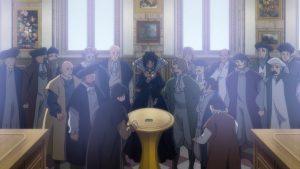 That’s a pretty convincing argument, but prejudice (and cowardice) are carrying the day in Fiore before Suleyman Bey delivers the news that Scoglio has fallen to the Empire. Even then – when Caterina reverses her earlier decision to stay neutral – there are those who’d prefer to surrender than to stand up to Balt-Rhein, especially resistance dependent on help from the Turks. Suleyman’s persistence saves Caterina from assassination and allows her to side with the Tripartite Alliance for now, but this is a leading indicator of the kind of headwinds Team Mahmut is going to be facing all across Rumerania.
That’s a pretty convincing argument, but prejudice (and cowardice) are carrying the day in Fiore before Suleyman Bey delivers the news that Scoglio has fallen to the Empire. Even then – when Caterina reverses her earlier decision to stay neutral – there are those who’d prefer to surrender than to stand up to Balt-Rhein, especially resistance dependent on help from the Turks. Suleyman’s persistence saves Caterina from assassination and allows her to side with the Tripartite Alliance for now, but this is a leading indicator of the kind of headwinds Team Mahmut is going to be facing all across Rumerania.
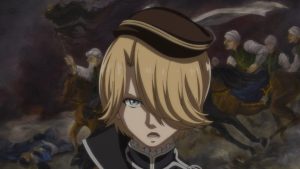 After a brief check-in with the allied forces across the battlefront, we rejoin Team Mahmut as they make for Taurus, another small city-state that Mahmut must enlist to allow safe passage for Turkiye’s expeditionary force. This involves a mock battle in order to convince the somewhat wacky twin mayors that Mahmut is a worthwhile ally, followed by a statement that he speaks the same language they do – and in a region where almost all military forces are mercenary, that language is universal.
After a brief check-in with the allied forces across the battlefront, we rejoin Team Mahmut as they make for Taurus, another small city-state that Mahmut must enlist to allow safe passage for Turkiye’s expeditionary force. This involves a mock battle in order to convince the somewhat wacky twin mayors that Mahmut is a worthwhile ally, followed by a statement that he speaks the same language they do – and in a region where almost all military forces are mercenary, that language is universal.
 There are a couple more moments here whose inclusion seems to suggest considerable importance later in the story. First there’s the matter of Vasco (Minegawa Junko) a young boy who appears to be the last survivor of the small republic of Campana, sacked and burned by the Empire. He’s picked up by the local Kulak, and pledges revenge – and then asks to be taken to Turkiye. And our old friend Louis is playing with toys – and he makes reference to “the last ray of hope for the Turkiye Pashalu – when danger befalls, this piece will always appear.” One supposes it’s going to appear next week, then, otherwise I don’t think he would have brought it up…
There are a couple more moments here whose inclusion seems to suggest considerable importance later in the story. First there’s the matter of Vasco (Minegawa Junko) a young boy who appears to be the last survivor of the small republic of Campana, sacked and burned by the Empire. He’s picked up by the local Kulak, and pledges revenge – and then asks to be taken to Turkiye. And our old friend Louis is playing with toys – and he makes reference to “the last ray of hope for the Turkiye Pashalu – when danger befalls, this piece will always appear.” One supposes it’s going to appear next week, then, otherwise I don’t think he would have brought it up…


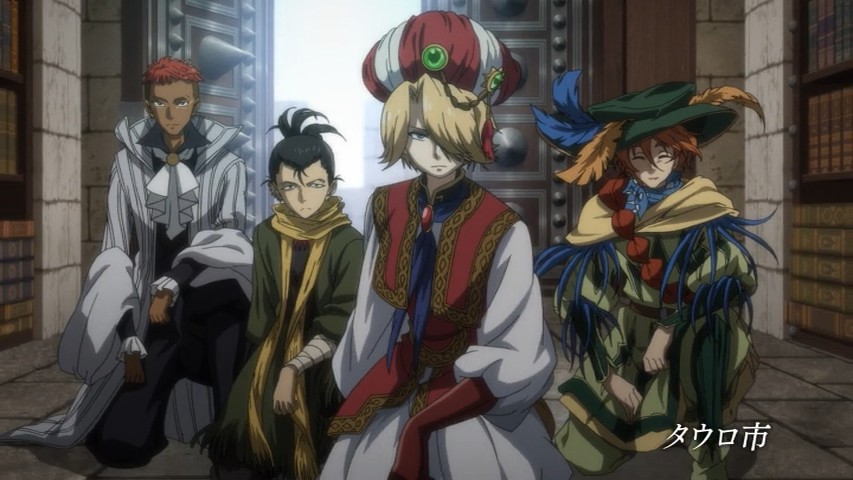


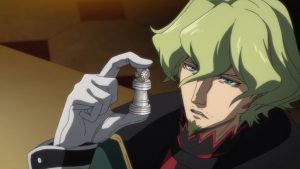
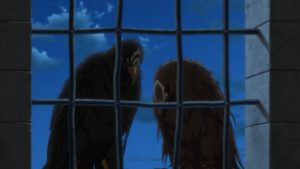



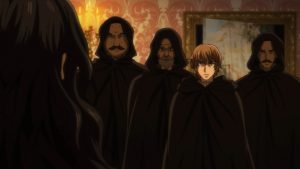

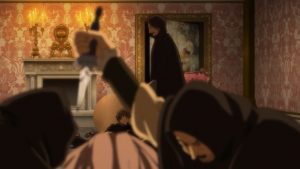

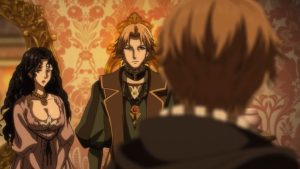

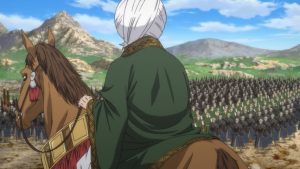

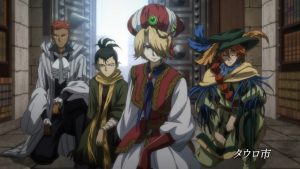
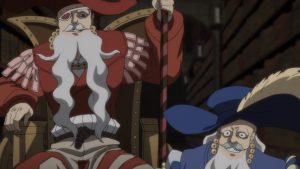



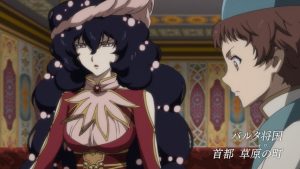
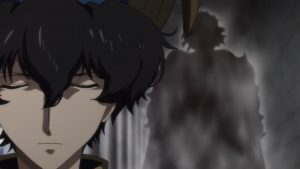

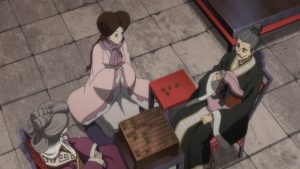




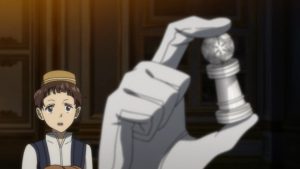



MFF
November 10, 2017 at 10:30 pmI like being completely wrong.
I wonder when we will see that piece of paper next. That will be interesting.
Nick
November 11, 2017 at 4:12 amI have no idea about what’s in the plans but I bet it’s for a huge fucking cannon.
dominus
November 12, 2017 at 10:33 amits interesting that this anime shows a inverted picture of true history. In the real world the Holy roman empire( Balt-Rhein in the anime) had to form a common front with many other countries like Venice, Spain, Portugal etc….. to stop the Turks (ottoman empire) from taking over the Mediterranean(centro in the anime) . The failed siege of Vienna changed world history i am curious if they are going for a inverted situation in the world of the anime(a siege of “Istanbul” maybe).
Guardian Enzo
November 12, 2017 at 11:02 amInteresting take. I see it as more of an amalgam than a reversal, with some elements matching up historically, some flipped and some completely original.
The Japanese are sort of “non-partisan” in all this – they had no stake in it and no cultural bias is inherent (at least not directly). So manga is a place where this sort of thing can, at least in theory, be played out as a theoretical exercise without a lot of historical bias.
dominus
November 12, 2017 at 12:42 pmIn Shoukoku no Altair religion is a lot less relevant( its absent most of the time ) in the real world the common alliance (holy league) was made by the Vatican(and the vatican has no” clone” in this series) so its uses real history as a base the rest is completely original.
Also Balt-Rhein Emperor is not directly involved with the war and that is a good political move because if the war ends in defeat he can simply say – Take Louis head he masterminded everything I just went along .